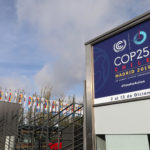The challenges of the Madrid Climate Summit
The Spanish capital gears up to host this year’s UN Climate Summit. Now in its 25th iteration, the annual conference will aim to approve programs to fight climate change and raise public awareness about the urgency of the challenge.

As atmospheric concentrations of primary greenhouse gases keep rising, with carbon dioxide at its highest level in three million years, governments across the world scramble to come up with the right formulas to fight global warming. To contribute to these efforts, every year for the past 25 years, the UN has been organizing the Conference of Parties of the UN Framework Convention on Climate Change, also known as the Climate Change Summit or COP (Conference of the Parties).
From December 2 to 13, Madrid will be hosting this year’s edition of the conference, after Chile pulled out from holding the event due to the wave of social unrest and demonstrations that has swept across the country. The main purpose of the conference is to get all countries to effectively commit to fight climate change by accepting specific obligations. The event will also include presentations on the latest updates regarding the state of world climate. “The results we’ve obtained thus far clearly underscore the severity of the global warming process," explains Jorge Olcina Cantos, chair of the Spanish Geographers Association and climate change expert.
Participants will address the full implementation of the Paris Agreement on Climate Change, the landmark binding agreement signed in 2015, which established a global plan to curb global warming and tackle the impending climate crisis. Negotiations between countries, according to Olcina, are still in their very early stages. Current emission objectives are established in accordance with the Kyoto protocol, which is set to expire in 2021. The primary goal of the Paris Agreement, which will replace Kyoto, is keeping the increase in global average temperature for the century below 2 °C.
According to Olcina this kind of summits are essential, because "despite the existence of the Paris Agreement’s as a framework document for the next decades, no specific commitments have been established yet." “Japan, Australia and the European Union are the only countries and regions that have laid out medium-term decarbonization plans for their economies, while the rest of the world’s countries and regions have made very little progress. And, even worse, the United States’ current stance is in opposition to this collective effort to save the planet,” he says. In November, U.S. President Donald Trump officially launched the formal process to withdraw from the Paris Climate Agreement.
Some, very few, country emission reduction plans were formally announced during last year’s summit. The European Union has already approved its plans for the decarbonization of its economy by 2050. "The European Union, Japan, Australia and New Zealand are the countries or regions that are working harder on this issue.”
The event will touch on a broad range of topics, including finance; energy transition; industrial transition; nature-based measures; local action and cities; and resilience and adaptation. Alongside this political and scientific scope, a number of social and sustainable actions will be carried out to raise awareness among society. In fact, the summit will be split into two zones: the green zone, which will host civil society events, and the blue one, where the United Nations negotiations will take place.
Besides the aforementioned topics, one of the most complex negotiations of the Summit will be the development of the rules to implement Article 6 of the Paris Agreement, which refers to the possibility of allowing countries with higher emissions reach agreements with countries with low emissions to meet their emission targets. “It indirectly recognizes the trading of emission rights already envisaged in the Kyoto Protocol, without explicitly mentioning it. But what it actually does is lay the groundwork for a financial mechanism to allow countries to negotiate agreements and trade with their emission rights,” considers Olcina. The article also urges countries to develop climate change mitigation and adaptation plans, with the involvement of public and private sectors.
Another pivotal point of discussion will be the so-called Warsaw Mechanism, which provides for financial and technical assistance to regions affected by climate change. "It’s a specific executive committee aimed at promoting and assessing countries' adaptation plans to the extreme effects of climate change," says Olcina. In its Fourth Assessment Report, approved in 2007, the UN Intergovernmental Panel on Climate Change (IPCC) established the link between global warming and the increase in extreme weather events such as floods, hurricanes, droughts or tornadoes. The Warsaw Mechanism will be revised during the Madrid summit, due to recent findings that “have proven that the link between climate change and atmospheric extremes is tighter than previously thought.” The expert explains that countries will be warned about the urgency of implementing policies to adapt territories to the effects of climate change.
The most sensitive and vulnerable industries to climate warming processes are agriculture, tourism and transport. “In agriculture we will have to create and roll out drought-resistant crops; sun-sand-sea tourism will have to adjust to higher summer temperatures and the decline in climate comfort at popular destinations; and changes in transport are going to expedite the sector’s transformation, which is already underway and from which there’s no turning back,” says Olcina.
Other issues concerning climate change related events affecting oceans, biodiversity or Antarctica will also be discussed during the event. Global warming is behind the severe disruption that’s already affecting many of earth’s ecosystems, especially in polar areas and tropical forests: “It is the most important environmental process facing Humanity in this century, without a doubt, because its impact affects all elements of the environment, economic activities and societies that live on Earth,” warns this expert on climate change.